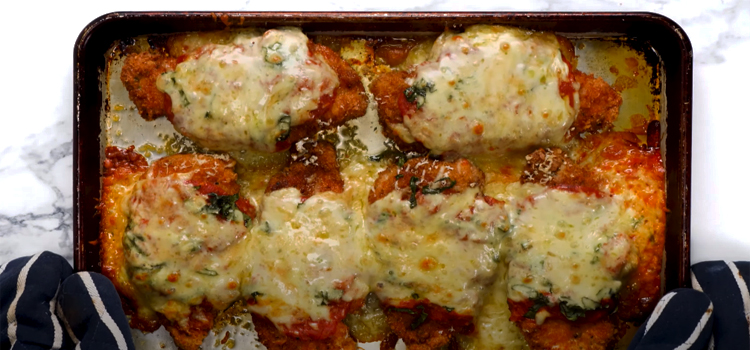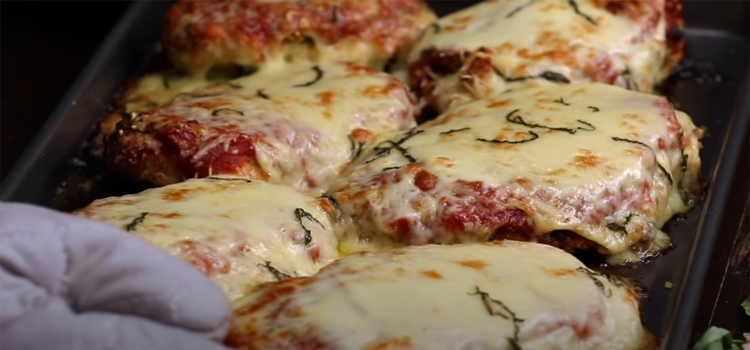Last Updated on September 13, 2024 by Shari Mason
**Chicken parmigiana**, a beloved dish among countless food enthusiasts (myself included), shines as a quintessential Italian-American delight, celebrated for its *mouthwatering taste* and *comforting texture*.
But how long does chicken parmesan last in the fridge?
The shelf life of chicken Parmesan depends on factors such as how it was prepared and stored and how long it’s been in the fridge. Here’s what I found out.
How Long Can Cooked Chicken Parmesan Last In The Fridge?


Cooked chicken parmesan can last in the fridge for up to 4 days when stored properly in an airtight container.
It’s important to note that the fresher the chicken parmesan is, the better the taste and texture will be.
Proper storage is key to maintaining the freshness and quality of the chicken parmesan.
“Chicken Parmesan might disappear quickly at dinner, but it can last a tasty while in the fridge – if you can resist its allure!”
– Eat Pallet Restaurant & Food Advice
It should be placed in an airtight container or wrapped tightly in plastic to prevent it from drying out and slowing down bacterial growth.
Also, it is important to store it in the refrigerator as soon as it has cooled down to prevent the growth of bacteria.
Read:
- Longhorn Parmesan Crusted Chicken Recipe
- How Long Does A Block Of Parmesan Last?
- Does Grated Parmesan Cheese Need To Be Refrigerated?
Can You Freeze Chicken Parmesan?
Yes, you can freeze chicken parmesan [1]. Freezing is a great way to extend the shelf life of cooked chicken parmesan.
To freeze it properly, it is recommended to wrap it tightly in plastic wrap or aluminum foil or place it in an airtight container or freezer bag.
This will help to protect it from freezer burn and maintain its texture and flavor.
When freezing chicken parmesan, it is important to ensure it has cooled down completely before putting it in the freezer.
“I always have Parmigiano-Reggiano, olive oil and pasta at home. When people get sick, they want chicken soup; I want spaghetti with parmesan cheese, olive oil and a bit of lemon zest. It makes me feel better every time.”
– Isabella Rossellini, Italian-American Actress
This will prevent the formation of ice crystals which can damage the texture of the food.
It is also important to label the container or bag with the freezing date, so you know how long it has been stored.
When ready to eat it, you can thaw it in the refrigerator or reheat it directly from frozen in a preheated oven at 350 degrees Fahrenheit for about 20-25 minutes or until it is heated through.
How Can You Tell If It Has Gone Bad?
- Off-odor: If the chicken parmesan has an off-odor, it is most likely spoiled and should be discarded.
- Visible Mold: If you see any mold on the chicken parmesan, it should not be consumed and thrown away.
- Slimy Texture: If the chicken parmesan has a slimy texture, it may have been contaminated with bacteria and should be discarded.
- Discoloration: If the chicken parmesan has changed color, for example, if the cheese or sauce has turned brown or gray, it’s a sign that it’s spoiled and should not be consumed.
How To Store Chicken Parmesan To Extend Shelf Life


- Use airtight containers or wrap them tightly in plastic wrap: This will help to prevent the chicken Parmesan from drying out and slow down bacterial growth.
- Store it in the refrigerator as soon as it has cooled down: This will help to prevent the growth of bacteria [2] and keep the chicken Parmesan fresh.
- Label the container or bag with the date of storage: This will help you track how long the chicken Parmesan has been stored, so you know when it’s time to consume it or discard it.
- Avoid storing it near strong-smelling foods: Chicken Parmesan can absorb odors easily, so it is important to store it away from strong-smelling foods.
- Reheat it to an internal temperature of 165°F: When reheating chicken Parmesan, it’s important to bring it to an internal temperature of 165°F to kill any bacteria that may have developed.
How Do You Reheat It?
- Oven: The best way to reheat chicken Parmesan is to place it in a preheated oven at 350 degrees Fahrenheit for about 15-20 minutes or until it is heated through. This will help to maintain the texture and flavor of the chicken Parmesan.
- Microwave: You can also reheat chicken Parmesan in the microwave, but it’s important to use a microwave-safe dish and cover it with a lid or plastic wrap to prevent it from drying. Depending on the microwave’s quantity and power, it may take a few minutes.
- Skillet: You can also reheat chicken Parmesan in a skillet on the stovetop over medium-low heat. This method will give you more control over the reheating process and allow you to adjust the heat to prevent the chicken from drying.
- Slow Cooker: You can also reheat chicken Parmesan in the slow cooker on low heat. This method will take longer, but it will be gentle on the chicken and keep it moist.
FAQs
u003cstrongu003eCan I eat cooked chicken after five days?u003c/strongu003e
Eating cooked chicken after five days in the refrigerator is not recommended as bacteria can grow on it. The United States Department of Agriculture (USDA) states that cooked chicken should be consumed or frozen within 3-4 days.
u003cstrongu003eCan you make chicken parmesan ahead of time?u003c/strongu003e
Yes, you can make chicken parmesan ahead of time. It can be made a day or two in advance and stored in the refrigerator in an airtight container.
u003cstrongu003eHow long can chicken parmesan last at room temperature?u003c/strongu003e
Cooked chicken parmesan should not be left at room temperature for more than 2 hours.
Final Thoughts
Chicken parmesan is a delicious and popular dish that can be enjoyed for several days when stored properly in the refrigerator.
The shelf life of chicken Parmesan depends on various factors, such as how it was prepared and stored and how long it’s been in the fridge.
Cooked chicken parmesan can last up to 4 days in the refrigerator when stored in an airtight container.
Before consuming it, it is important to check for signs of spoilage, such as off-odor, visible mold, slimy texture, or discoloration.
Freezing is also an option to extend its shelf life, but it should be wrapped tightly in plastic or aluminum foil or placed in an airtight container or freezer bag and labeled with the freezing date.
References:
- https://www.allrecipes.com/recipe/223042/chicken-parmesan/
- https://www.genome.gov/genetics-glossary/Bacteria
- Can You Put an AC Unit in the Kitchen? - September 27, 2024
- What Cheese Does Olive Garden Use? Discover Their Signature - September 27, 2024
- How to Cancel a Pizza Hut Order? Quick & Easy Guide - September 24, 2024


